Raising Achievement of All Learners
Achievement for All
Tuesday, November 27, 2018
The high cost of school failure and inequity for individuals, and for society more widely, is increasingly being recognised across Europe. Raising the achievement of all learners is seen not just as a policy initiative, but also as an ethical imperative.
Research by Aidan Rome, Jessica Hardy, Jamie Richardson and Felicity Shenton
Published by European Agency for Inclusion, (2017)
The Raising the Achievement of All Learners in Inclusive Education project (2014-2017) aimed to provide evidence of effective practice in raising achievement and building the capacity of schools and communities to include and support all learners.
The key questions for the project were:
- What pedagogical strategies/teaching approaches best support learning and are effective in raising the achievement (academic and social) of all learners?
- How can school leaders best support:
- The development, implementation and monitoring of inputs and processes for raising achievement?
- The participation of learners, parents/carers in the learning process?
- The measurement of all forms of achievement and analysis of outcomes to inform further development?
About the study
The Raising Achievement project involved a range of stakeholders including school leaders, researchers, teachers, parents and learners, as well as local and national policy makers from 44 countries.
The project questions were considered in the context of national/local policy and how it can best support learning communities to undertake organisational development and enable school leaders to raise the achievement of all learners - in particular through collaborative approaches.

UK Country report
The Children and Families Act (2014), given royal assent in March 2014, legislated for a more inclusive approach in educational settings for learners with special educational needs and disabilities (SEND). The SEND 0-25 Code of Practice (Department for Education/Department of Health, 2015) is statutory guidance for all those working with learners with special educational needs and disabilities. It emphasises the centrality of parent, carer and learners' ‘voice' in shaping decisions concerning their lives.
Achievement for All
The Achievement for All programme was central to government special educational needs reform in the UK. The collaborative, inclusive approach to teaching and learning has informed the 0-25 SEND Code of Practice. Employing an evidence-based, integrated, whole school improvement framework, it enables schools to identify current good practices and highlight areas of challenge for further development across the following four interdependent key areas:
- Leadership - development of vision, commitment of leaders to vision, communication across the school and collaborative approaches
- Teaching and Learning - quality teaching, recording, tracking, monitoring and evaluating pupil progress and attainment and assessment processes
- Wider opportunities - pupil social development and well-being, attendance, safety and bullying and provision of extra-curricular activities
- Parental engagement - structured approaches to engaging parents in their child's learning in school and at home.
In 2014/15, Achievement for All (AfA) programmes supported 172,111 targeted children and young people with challenges, needs and disadvantages to achieve academic progress at or beyond national levels; supported nearly 70,000 professionals to improve outcomes for the lowest achieving 20 per cent; and helped over 250,000 parents and carers engage better with their child's learning.
The Achievement for All pilot (2009-11) showed that when teachers are given responsibility for the pupils in their classroom, supported by senior leaders and provided with focused training, pupil academic and wider outcomes are significantly improved (Humphrey and Squires, 2011).
Implementation
Working across the school community, the achievement coach and school champion develop an action plan that supports the implementation of the four key elements. This includes high impact and evidence-based core interventions, alongside and blended with a series of tailored school-driven activities.
At the time of the report, AfA had worked with over 2,000 primary and secondary schools in England and Wales, along with schools in Norway, the USA, Lithuania and Latvia.
In England, schools working with Achievement for All are diverse in: pupil profile (socio-economic status, ethnicity, English as an additional language and SEN); Ofsted rating (from "requires improvement" to "outstanding"; geographical situation (cities, towns, rural and coastal regions); size (small primary schools to large secondary schools).
Implications for practice
- Data from an independent evaluation by PricewaterhouseCoopers (2016) in England showed that identified pupils - those with socio-economic disadvantage, those with SEND and others vulnerable to underachievement - in Achievement for All schools made more progress on an annual basis than similar pupils in other schools. The focus is raised achievement in reading, writing and maths of learners with SEND, pupils with socio-economic disadvantage and others vulnerable to underachievement.
- According to 83 per cent of teachers, the Achievement for All training proved to be of benefit to them in their role (PwC, 2014).
- Leadership in Achievement for All schools is also enhanced through an inclusive model focusing on vision, commitment, collaboration and communication (NCSL, 2009).
- The impact of the Achievement for All programme is across the school.
FURTHER READING
Achievement for All Social Impact Assessment, PwC, 2016
Achievement for All National Evaluation, 2013
Achievement For All Interim Report, Humphrey and Squires, 2011
National College for Leadership of Schools and Children's Services, 2009-11




